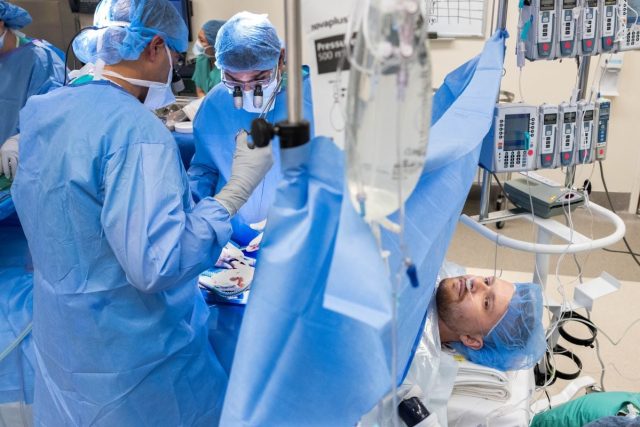A spinal injection was used to anesthetize the patient while he remained awake
By Physician’s Briefing Staff HealthDay Reporter
MONDAY, June 24, 2024 (HealthDay News) — John Nicolas, a Chicago resident, has become the first person to receive a kidney transplant while awake, according to his doctors at Northwestern Medicine in Chicago.
Instead of using the normal general anesthesia, doctors used a single spinal injection to anesthetize Nicolas while allowing him to remain alert.
“At one point during surgery, I recall asking, ‘Should I be expecting the spinal anesthesia to kick in?'” Nicolas, 28, recalled in a news release. “They had already been doing a lot of work and I had been completely oblivious to that fact. Truly, no sensation whatsoever.”
This new option could make transplantation available to patients whose health makes them a high risk for general anesthesia, doctors say. It also could substantially decrease the length of a transplant patient’s hospital stay.
Nicolas walked out of the hospital the day after his successful surgery, which occurred on May 24. Typically, kidney transplant patients spend two to three days in the hospital, doctors said.
“Inside the operating room, it was an incredible experience being able to show a patient what their new kidney looked like before placing it inside the body,” Satish Nadig, M.D., a transplant surgeon and director of the Northwestern Medicine Comprehensive Transplant Center, said in a news release. “The other exciting element is that the patient was able to be discharged home in less than 24 hours, basically making this an outpatient procedure. Our hope is that awake kidney transplantation can decrease some of the risks of general anesthesia while also shortening a patient’s hospital stay.”
Nicolas’s surgical team performed his kidney transplant in less than two hours. Nicolas did not have any health risks that would have prohibited general anesthesia, nor did he have any phobia about it. In fact, his age and limited risk factors made him an ideal candidate to participate in a medical first, and Nicolas leapt at the opportunity.
“He is an extremely compliant patient who was in tune with his body and willing to push the envelope,” said Vinayak Rohan, M.D., a transplant surgeon at Northwestern Memorial Hospital. “He had the upmost faith in us, and we had the upmost faith in him.”
Northwestern Medicine plans to make this sort of surgery available to patients who cannot have general anesthesia or might otherwise benefit from it.
Copyright © 2024 HealthDay. All rights reserved.



















